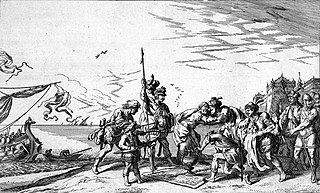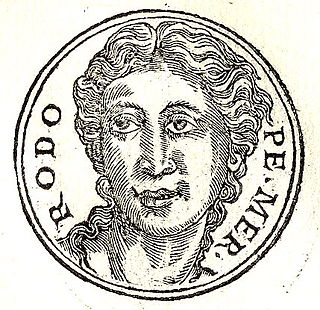Related Research Articles

In Greek mythology, Anius was a king of Delos and priest of Apollo.
In Greek mythology, Epopeus was the name of the following figures:
In Greek mythology, Ampyx or Ampycus was the name of the following figures:

In the Aeneid of Virgil, Achaemenides was a son of Adamastos of Ithaca, and one of Ulysses's crew. He was marooned on Sicily when Ulysses fled the Cyclops Polyphemus, until Aeneas arrived and took him to Italy with his company of refugee Trojans.
In Greek mythology, Arcas was a hunter who became king of Arcadia. He was remembered for having taught people the arts of weaving and baking bread.

In Greek mythology, Lotis was a nymph mentioned by Ovid.
Aphareus may refer to the following figures.
In Greek mythology, Assaracus was a king of Dardania.
In Greek mythology, Schoeneus was the name of several individuals:
In Greek mythology, the name Butes referred to several different people.
There are several characters named Acmon or Akmon in Greek mythology:
In Roman mythology, the Aeneads were the friends, family and companions of Aeneas, with whom they fled from Troy after the Trojan War. Aenides was another patronymic from Aeneas, which is applied by Gaius Valerius Flaccus to the inhabitants of Cyzicus, whose town was believed to have been founded by Cyzicus, the son of Aeneas and Aenete. Similarly, Aeneades was a patronymic from Aeneas, and applied as a surname to those who were believed to have been descended from him, such as Ascanius, Augustus, and the Romans in general.
Alexirrhoe or Alexiroe is a name in Greek mythology that may refer to following women:
Talos was a mythological Greek inventor. He is probably Perdix and nephew of Daedalus. On some accounts, Talos was also called Attalus.

In Greek mythology, Rhodope was a queen of Thrace and the wife of Haemus. Haemus was vain and haughty and compared himself and Rhodope to Zeus and Hera, who were offended and changed the couple into mountains.
Aegiale or Aegialeia or Aegialia was, in Greek mythology, a daughter of Adrastus and Amphithea, or of Aegialeus the son of Adrastus, whence she bears the surname of Adrastine. One account refers to her as Euryaleia.
Macar or Macareus was, in Greek mythology, the son of Aeolus, though sources disagree as to which bearer of this name was his father: it could either be Aeolus the lord of the winds, or Aeolus the king of Tyrrhenia. His mother was, at least in the latter case, Amphithea.
In Greek mythology, Pierus, was the king of Emathia in Macedonia. He was the eponym of Pieria and Mt. Pierus. Pierus was credited to be the first to write in the praise of the Muses.
In Greek mythology, Abaris was a Caucasian, who was in the court of King Cepheus of Ethiopia. He was killed by the hero Perseus, along with the other Ethiopian chiefs, during his battle with Phineus, brother of the king and betrothed of Andromeda.
In Greek mythology, Amphissa was the daughter of Macareus and a lover of Apollo. She was the eponym of the city Amphissa in Ozolian Locris.
References
- Publius Ovidius Naso, Metamorphoses translated by Brookes More (1859-1942). Boston, Cornhill Publishing Co. 1922. Online version at the Perseus Digital Library.
- Publius Ovidius Naso, Metamorphoses. Hugo Magnus. Gotha (Germany). Friedr. Andr. Perthes. 1892. Latin text available at the Perseus Digital Library.
| | This article relating to Greek mythology is a stub. You can help Wikipedia by expanding it. |